
Little do you know that it is an Eisenhower dollar!
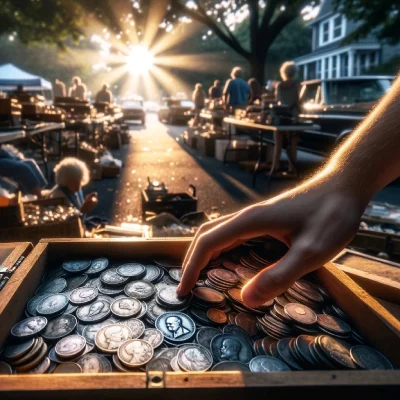
The Eisenhower dollars value has remained constant throughout the course of time, solidifying its standing as a coveted gem in the world of numismatics. Minted from 1971 to 1978, their worth often surpasses their face value. Crafted with a generous amount of silver, copper, and nickel, Eisenhower dollars have made their way to several numismatics collections.

If you wish to diversify your portfolio, you know what to look for in these coins!
The next time you sift through coins in a garage sale or have a look at your old coin collection, look a little closer. You might warn yourself a fortune!
Despite this, a coin collector must keep an extensive understanding base. Why are “S” mintmarks more valuable? Why are Eisenhower dollars so popular? How many types of these dollars are available for purchase? What value do these coins carry?
Let us answer all these questions by understanding the different Eisenhower dollars.
The 1971 Eisenhower dollar marks the beginning of this popular coin series and is a real crowd-pleaser. By the 1970s, the US needed a new dollar coin. The gaming industry also looked for an ideal replacement for the silver dollars used in thousands of slot machines.
This, along with the desire to commemorate President Eisenhower, made the Congress introduce the first (1971) Eisenhower dollar.
While the Director of the US Mint insisted on minting these coins in silver, Congress preferred striking them in a copper-nickel composition. To compensate, silver-clad coins were struck, especially for collection purposes.
While the Philadelphia and Denver 1971 Eisenhower dollars were struck in the copper-nickel composition, the ones minted in San Fransisco were struck in 40% silver.
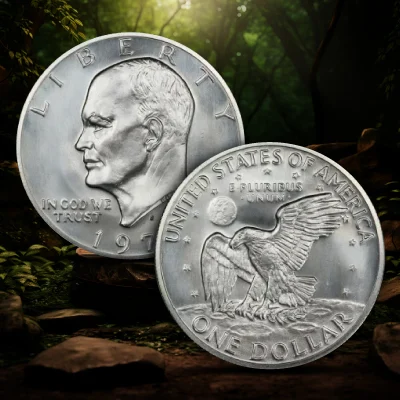
The designs of all Eisenhower dollars are more or less the same. The 1971 Eisenhower dollar coin’s obverse section carries the left-facing portrait of President Eisenhower. We see the motto “IN GOD WE TRUST” below the President’s chin. The word “LIBERTY” is written on the top, between the President’s head and the coin’s rim. The bottom of the coin bears its mint date.
You can find the mintmarks (if present) above the last two date digits. While the Philadelphia coins carry no mintmarks, the Denver and San Fransisco coins bear the mintmarks “D” and “S” respectively.
The center of the coin’s reverse section shows a bald eagle descending, with an olive branch in its talons.
Below the eagle lies a lunar surface, signifying the Apollo 11 mission. We can see planet Earth above the eagle, with North America clearly visible. Thirteen five-point stars surround the eagle, signifying the first thirteen states gaining independence.
Between the eagle and the ring of stars, we see the motto “E PLURIBUS UNUM.” Adjacent to the coin’s upper rim are the words “UNITED STATES OF AMERICA.” Adjacent to the coin’s upper rim are the words “UNITED STATES OF AMERICA.” The coin’s denomination is visible around its bottom.
The 1971 Eisenhower dollar value can range from $1 to over $12,000, depending on its composition, design, rarity, and historical significance.
Let’s have a better look at the coins’ value with a table:
| Coin | Type | Condition | Lowest Value | Highest Value |
|---|---|---|---|---|
| 1971 Eisenhower | MS | $2.15 | $12,000 | |
| 1971-D Eisenhower | MS | $2.65 | $11,300 | |
| 1971-S Eisenhower | Silver | MS | $9.45 | $10,100 |
| 1971-S Eisenhower | Silver | MS | $9.45 | $10,100 |
| 1971-S Eisenhower | Silver | PR DCAM | $12,600 | $36,000 |
While 1971 marked the beginning of the Eisenhower dollars, the coins were refined during their second year, i.e., 1972. This is when the US Mint’s Chief Engraver Frank Gasparro reworked minor design deficiencies and created three different varieties of the 1972 Eisenhower dollar – type I, type II, and type III.

Differences between the three variants lie in their reverse sections, where you can see the Caribbean islands, North America, and Central America. 1972 Eisenhower dollar type I shows the three islands off the Florida coast.
Type II of this coin is the rarest and, therefore, carries the highest 1972 Eisenhower dollar value in the category. This is because the US Mint struck this variant using a reverse die intended for the proof version. With a higher relief feature, this coin shows Florida as a single triangular funnel and the Caribbean islands as a single large land mass.
The islands on the type III variant are distinguishable. Here, the island on the upper left goes past the western edge of Florida. This US Mint finalized this design and used it for subsequent Eisenhower dollars.
As of July 2024, the 1972 Eisenhower dollar value for type I ranges from $3.38 to $4,000 (across Philadelphia, Denver, and San Francisco Mints). The type II coins boast the highest value, ranging from $74 to a whopping $10,800. The third variant (type III) carries a value ranging from $2.15 to $1,500. All these rates are for MS (Mint State) coins.
This was a non-circulating Eisenhower dollar that served as a legal tender. 1971 and 1972 witnessed the production of the Eisenhower dollars at an enormous scale. The US Mint produced over 116 million and 168 million circulation strikes in 1971 and 1972 respectively.
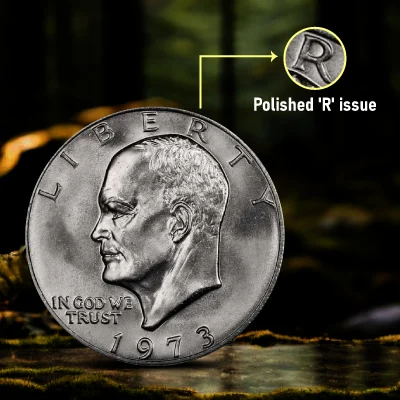
In 1973, the Mint decided to waive the striking of any more coins for circulation purposes. Instead, it minted two million coins from each mint just to include them in the US annual Mint Set.
As opposed to their precursors, the 1973 Eisenhower dollar coins were struck using dies of 52100 die steel. This made the coins sharply struck, giving them a higher definition.
Limited and exclusive production of the 1973 Eisenhower dollars led to a few errors in the coins. These coins still carry a high 1973 Eisenhower dollar value. OK (off at the knees), Peg Legs are the most popular error varieties of these coins.
Here, the “R” in “LIBERTY” is polished in a way that half of its base goes missing. If you have such an Eisenhower dollar with you, you are looking at a few thousand dollars in the open market!
Here is a comprehensive table giving you a clear idea about the 1973
Eisenhower dollar value:
| Coin | Type | Condition | Lowest Value | Highest Value |
|---|---|---|---|---|
| 1973-D Eisenhower | MS | $3.38 | $4380 | |
| 1973-S | Silver | MS | $9.79 | $7500 |
| 1973-S Eisenhower | Clad | PR | $5.40 | $1250 |
| 1973-S Eisenhower | Clad | PR CAM | $5.40 | $2250 |
| 1973-S Eisenhower | Clad | PR DCAM | $9.38 | $3250 |
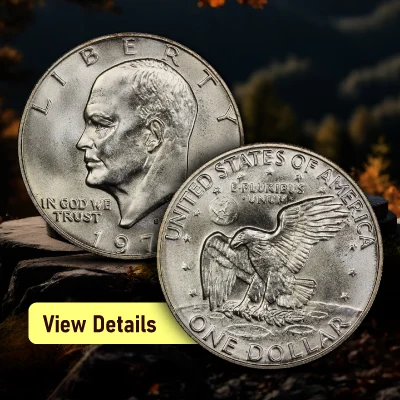
After the circulation slump of 1973, 1974 marked the resurgence of Eisenhower dollar circulation. The US Mint anticipated high demand for these coins after 1973, leading to the production of over 27 million and over 45 million coins by the Philadelphia and Denver Mints respectively.
On the other hand, the San Fransisco Mint produced only 1.3 million coins. Such rarity increased the silver-clad 1974 Eisenhower dollar value.
As of July 2024, the Mint State 1974 Eisenhower dollar value for a Philadelphia coin ranges from $2.15 to $11,500. The value of a 1974-D $1 MS stays between $2.15 and $2,500. The silver-clad MS 1974-S is currently valued between $10.13 and $8,750.

During 1975 and 1976, the US Mint issued special edition Eisenhower dollars known as Bicentennial coins. As the name suggests, these coins were minted to commemorate the 200th independence anniversary of the United States of America. This is why a 1976 Eisenhower dollar includes two dates – 1976 and 1776.
While a lot of these coins were also minted in 1975, the Government kept the same date on all coins to prevent hoarding. The design on the coins’ obverse section was changed to honor the American Bicentennial.
There was also a change on the coins’ reverse, where the Liberty Bell overlapping the moon replaced the Apollo 11 depiction. The right of the bell clapper shows the initials of the new 22-year-old designer, Dennis R. Williams. On the coin’s top, you can see “UNITED STATES OF AMERICA” with two stars.
In 1976, the US Mint produced two types of Philadelphia and Denver coins – type I and type II. The type I variant sported thicker letters on the reverse than the second variant. There is no difference between the varieties up to the MS65 grades.
Let us have a more comprehensive look at the 1976 Eisenhower dollar value with this table:
| Coin | Type | Condition | Lowest Value | Highest Value |
|---|---|---|---|---|
| 1976 Eisenhower $1 | Type1 | MS | $2.64 | $2,250 |
| 1976 Eisenhower $1 | Type2 | MS | $2.15 | $3,000 |
| 1976 -D Eisenhower $1 | Type3 | MS | $2.15 | $10,800 |
| 1976 -D Eisenhower $1 | Type4 | MS | $2.15 | $3,000 |
| 1976 Eisenhower $1 | Silver | MS | $8.36 | $21,600 |

The American Eagle landing on the moon for the Apollo 11 mission returned with the 1977 Eisenhower dollar. Moreover, the US added another feather to its cap in 1977 with the launch of the Voyager 1 and 2.
While the new set of coins was not suitable for circulation, the Philadelphia Mint produced over 12.5 million coins out of which more than two million coins were kept in the annual Mint Set.
The Denver and San Fransisco Mints produced a little over 32.9 and over 3.2 million coins respectively.
The table here shows the key 1977 Eisenhower dollar values:
| Coin | Type | Lowest Value | Highest Value |
|---|---|---|---|
| 1977 Eisenhower Dollar | MS | $2.15 | $2,500 |
| 1977-D Eisenhower Dollar | MS | $2.15 | $4.750 |
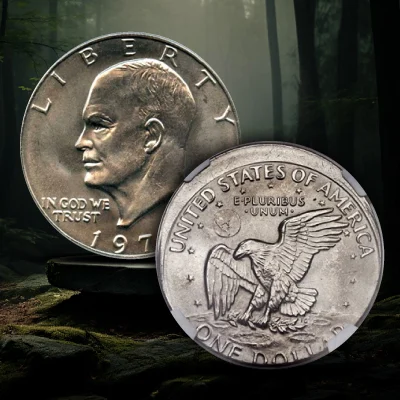
This is the last set of Eisenhower dollars before the Susan B. Anthony dollars were struck and circulated. With 38.1 mm in diameter, the Eisenhower dollars were of the same size as the silver dollars the US Mint struck until 1935.
By 1976, concrete talks and decisions about rethinking the American coinage were underway. This was when the Research Triangle Institute suggested the introduction of “more convenient-sized” dollar coins.
For one last time, the US Mint produced a little over 25.7 million coins in Philadelphia, over 33 million coins in Denver, and over 3.1 million coins in San Fransisco.
The table below shows the 1978 Eisenhower dollar value of a Philadelphia and Denver coin.
| Coin | Type | Lowest Value | Highest Value |
|---|---|---|---|
| 1978 Eisenhower Dollar | MS | $2.15 | $7,500 |
| 1978-D Eisenhower Dollar | MS | $2.15 | $8.750 |
If you are a true-blue coin collector, you might want to explore the rarest varieties of the Eisenhower dollars. With extreme rarity and high historical significance, these coins are in a league of their own. From the 1971-S Eisenhower dollar prototypes worth $264,000 to the unique “cloverleaf” Eisenhower dollar worth $105,000, there are a handful of these coins that possess unmatched value, making them a treasure trove for coin collectors!
Let us have a look at a few of them:
| Coin and Year | Value | Auction Place |
|---|---|---|
| 1971-S Eisenhower Dollar Prototypes | $264,000 | Heritage Auctions |
| 1971-S Chatham prototype Eisenhower Dollar | $102,000 | Heritage Auctions |
| Unique "Clover Leaf" Eisenhower Dollar Error | $105,000 | Heritage Auctions |
| 1776-1976 TYPE I $ MS | $28,200 | Heritage Auctions |
| 1776-1976 TYPE I $ MS | $27,025 | Heritage Auctions |
| 1977-D $1 MS | $26,400 | Heritage Auctions |
| 1776-1976 S T-1 CLAD $1 PF | $25,300 | Heritage Auctions |
| 1776-1976 S T-1 CLAD $1 PF | $20,160 | TeleTrade |
| 1776-1976 S Silver $1 MS | $18,600 | Heritage Auctions |
| 1977-D $1 MS | $17,625 | Heritage Auctions |
| 1776-1976 TYPE I $ MS | $14,100 | Heritage Auctions |
| 1971-S Silver $1 PF | $13,800 | Heritage Auctions |
| 1972-D $1 MS | $13,200 | Heritage Auctions |
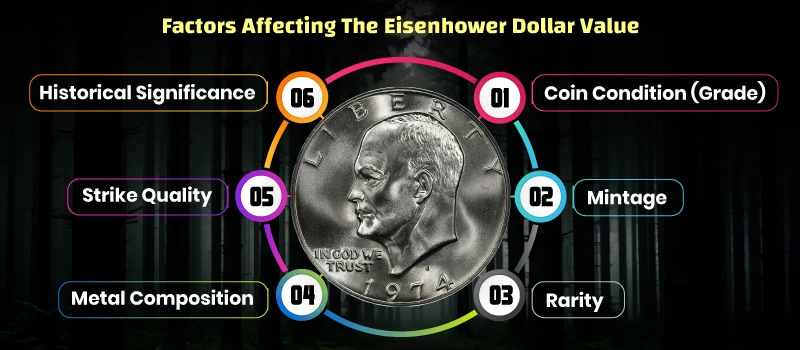
Before you start your hunt for the most valuable coin to add to your collection, let us have a look at some of the most important factors affecting the Eisenhower dollar value:
The condition of a coin has the maximum influence on its value. This is determined by an extensive grading process. Professional grading companies have trained numismatics to examine every coin under magnification. They pay keen attention to details like luster, surface imperfections, strike quality, authenticity, and more. From BU (brilliantly uncirculated) to a heavily worn-out condition, an Eisenhower dollar’s condition determines its true value.
Mintage, or the number of Eisenhower dollars minted during a specific year, also affects a coin’s value. Usually, lower mintage makes a coin more valuable due to exclusivity.
A fundamental rule of Economics states that rare objects have higher demand, making them more valuable. The same is true for the Eisenhower dollars. In most cases, rare design variations or errors significantly increase a coin’s value.
While the Philadelphia and Denver Eisenhower coins are made from a copper-nickel alloy, the ones minted in San Fransisco contain 40% pure silver. High silver content often lends a coin higher value.
Coins that are well-struck are often more valuable (unless there is a rare error) as they carry crisp and well-defined details.
Coins commemorating a specific historic event are considered more valuable, thanks to their exclusive nature. For example, the Bicentennial Eisenhower dollars of 1975 and 1976 carry more value than other coins (keeping other factors constant).
If you are a bullion coins enthusiast, you have multiple Eisenhower dollar options to explore as you expand your portfolio. Over the course of eight years, the series of US coinage went through significant changes that also had a positive impact on the Eisenhower dollars value due to its variations and rarity. Almost every year brought with it some unique significance each Eisenhower dollar reflects. If you have made up your mind and have a favorite Eisenhower dollar, approach a reliable coin dealer like BOLD Precious Metals!
At BOLD, we have an excellent variety of vintage Pre-1921 Morgan Silver Dollars, Pre-1933 Saint Gaudens, and Liberty Eagle Gold Coins, all at the lowest prices.
Having been in business for over eight years and serving our valued customers, we are committed to establishing relationships that endure. By facilitating the purchase of precious metals such as gold, silver, platinum, copper, and palladium, BOLD Precious Metals ensures these valuable metals are accessible to all at the best affordable prices.